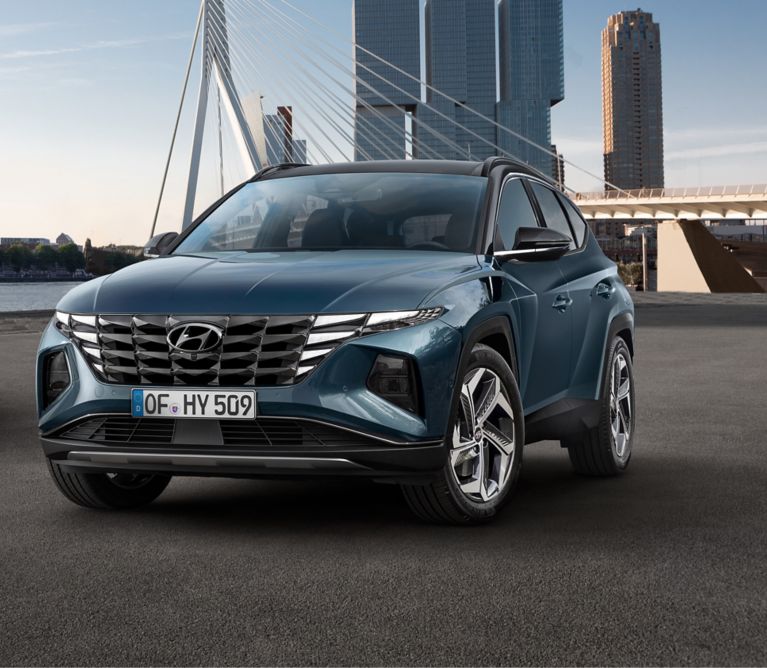- Hyundai Motor celebrates strong November, with 45,837 vehicle registrations and sales up 41.6 per cent compared to November 2020
- Company sold 472,852 units from January to November, up 24.3 per cent compared to the same period in 2020
- Hyundai gained a market share of 0.9 percentage points across first eleven months of year
Press material
-
Download
Hyundai Motor continues to outperform the European market, with sales up 41.6 per cent in November 2021 compared to the same month in 2020, according to the latest data from the European Automobile Manufacturers Association (ACEA). At 4.4 per cent, the automaker’s year-to-date market share was also up 0.9 percentage points from 2020 in the EU, EFTA and the UK.
In November 2021, 45,837 units of Hyundai vehicles were registered in Europe, an increase of 41.6 per cent compared to November 2020. This compared favourably to the overall market, which was down -17.5 per cent last month.
Between January to November, the company sold 472,852 units across the continent. This corresponds to an increase of 24.3 per cent compared to the same period in 2020, outperforming the overall market, which was up 0.8 per cent.
Hyundai’s main sales drivers included TUCSON, KONA and the company’s i-range. Other popular models are derived from the company’s future mobility line-up. This includes KONA Electric, which is produced in Europe at the company’s Czech plant, and IONIQ 5, which was recently named 2022 German Car of the Year and is also shortlisted for the prestigious 2022 European Car of the Year award. With multiple new product launches in recent years, Hyundai now boasts one of the youngest line-ups in the industry.
About ACEA
The European Automobile Manufacturers’ Association (ACEA) represents the 15 major Europe-based car, van, truck and bus makers. ACEA works with a variety of institutional, non-governmental, research and civil society partners, as well as a number of industry associations with related interests.
Disclaimer: CO2 and emissions data
- Fuel consumption combined for the Hyundai TUCSON 1.6 T-GDI 48V (150 PS) with 6iMT 2WD in l/100 km: 6.8 - 6.5; CO2 emissions combined in g/km: 154 - 147 (WLTP)
- Fuel consumption combined for the Hyundai TUCSON 1.6 T-GDI 48V (150 PS) with 7DCT 2WD in l/100 km: 6.6 - 6.3; CO2 emissions combined in g/km: 150 - 143 (WLTP)
- Fuel consumption combined for the Hyundai TUCSON 1.6 T-GDI 48V (180 PS) with 6iMT 2WD in l/100 km: 6.7 - 6.4; CO2 emissions combined in g/km: 152 - 145 (WLTP)
- Fuel consumption combined for the Hyundai TUCSON 1.6 T-GDI 48V (180 PS) with 7DCT 4WD in l/100 km: 7.1 - 6.9; CO2 emissions combined in g/km: 162 - 156 (WLTP)
- Fuel consumption combined for the Hyundai TUCSON 1.6 CRDi 48V (136 PS) with 6iMT 2WD in l/100 km: 5.3 - 5.0; CO2 emissions combined in g/km: 140 - 130 (WLTP)
- Fuel consumption combined for the Hyundai TUCSON 1.6 CRDi 48V (136 PS) with 7DCT 2WD in l/100 km: 5.6 - 5.2; CO2 emissions combined in g/km: 146 - 137 (WLTP)
- Fuel consumption combined for the Hyundai TUCSON 1.6 CRDi 48V (136 PS) with 7DCT 4WD in l/100 km: 6.0 - 5.7; CO2 emissions combined in g/km: 158 - 149 (WLTP)
- Fuel consumption combined for the Hyundai TUCSON 1.6 T-GDI (150 PS) with 6MT 2WD in l/100 km: 7.0 - 6.6; CO2 emissions combined in g/km: 159 - 150 (WLTP)
- Fuel consumption combined for the Hyundai TUCSON 1.6 T-GDI (150 PS) with 6MT 4WD in l/100 km: 7.8 - 7.3; CO2 emissions combined in g/km: 178 - 165 (WLTP)
- Fuel consumption combined for the Hyundai TUCSON 1.6 CRDi (115 PS) with 6MT 2WD in l/100 km: 5.6 - 5.2; CO2 emissions combined in g/km: 146 - 137 (WLTP)
- Fuel consumption combined for the Hyundai TUCSON 1.6 T-GDI Hybrid with 6AT 2WD in l/100 km: 5.9 - 5.5; CO2 emissions combined in g/km: 135 - 125 (WLTP)
- Fuel consumption combined for the Hyundai TUCSON 1.6 T-GDI Hybrid with 6AT 4WD in l/100 km: 6.6 - 6.2; CO2 emissions combined in g/km: 149 - 140 (WLTP)
- Fuel consumption combined for the Hyundai TUCSON 1.6 T-GDI Plug-in Hybrid with 6AT 4WD in l/100 km: 1.4; CO2 emissions combined in g/km: 31 (WLTP)
- Fuel consumption combined for the Hyundai KONA 1.0 T-GDI with 6MT 2WD in l/100 km: 6.1 - 5.7; CO2 emissions combined in g/km: 137 - 128 (WLTP)
- Fuel consumption combined for the Hyundai KONA 1.0 T-GDI with 7DCT 4WD in l/100 km: 6.0 - 5.8; CO2 emissions combined in g/km: 137 - 132 (WLTP)
- Fuel consumption combined for the Hyundai KONA 1.0 T-GDI 48V with 6iMT 2WD in l/100 km: 6.1 - 5.5; CO2 emissions combined in g/km: 139 - 124 (WLTP)
- Fuel consumption combined for the Hyundai KONA 1.6 T-GDI with 7DCT 2WD in l/100 km: 6.7 - 6.2; CO2 emissions combined in g/km: 152 - 142 (WLTP)
- Fuel consumption combined for the Hyundai KONA 1.6 T-GDI with 7DCT 4WD in l/100 km: 7.4 - 7.0; CO2 emissions combined in g/km: 167 - 160 (WLTP)
- Fuel consumption combined for the Hyundai KONA 1.6 CRDi with 6iMT 2WD in l/100 km: 5.2 - 4.7; CO2 emissions combined in g/km: 136 - 124 (WLTP)
- Fuel consumption combined for the Hyundai KONA 1.6 CRDi with 7DCT 2WD in l/100 km: 5.2 - 4.7; CO2 emissions combined in g/km: 136 - 124 (WLTP)
- Fuel consumption combined for the Hyundai KONA 1.6 CRDi with 7DCT 4WD in l/100 km: 5.6 - 5.2; CO2 emissions combined in g/km: 147 - 137 (WLTP)
- Fuel consumption combined for the Hyundai KONA Hybrid 1.6 GDI Hybrid in l/100 km: 5.4 - 5.0; CO2 emissions combined in g/km: 122 - 114 (WLTP)
- Electricity consumption combined for the Hyundai KONA Electric 39.2 kWh in kWh/100 km: 14.3; CO2 emissions combined in g/km: 0 (WLTP)
- Electricity consumption combined for the Hyundai KONA Electric 64 kWh in kWh/100 km: 14.7; CO2 emissions combined in g/km: 0 (WLTP)
- Fuel consumption combined for the Hyundai KONA N 2.0 T-GDI (280 PS) with DCT in l/100 km: 8.5; CO2 emissions combined in g/km: 194 (WLTP)
- Electricity consumption combined for the Hyundai IONIQ 5 58 kWh with 2WD in kWh/100 km: 16.7; CO2 emissions combined in g/km: 0 (WLTP)
- Electricity consumption combined for the Hyundai IONIQ 5 58 kWh with 4WD in kWh/100 km: 18.1; CO2 emissions combined in g/km: 0 (WLTP)
- Electricity consumption combined for the Hyundai IONIQ 5 72.6 kWh (19” alloy rims) with 2WD in kWh/100 km: 16.8; CO2 emissions combined in g/km: 0 (WLTP)
- Electricity consumption combined for the Hyundai IONIQ 5 72.6 kWh (20” alloy rims) with 2WD in kWh/100 km: 17.9; CO2 emissions combined in g/km: 0 (WLTP)
- Electricity consumption combined for the Hyundai IONIQ 5 72.6 kWh (19” alloy rims) with 4WD in kWh/100 km: 17.7; CO2 emissions combined in g/km: 0 (WLTP)
- Electricity consumption combined for the Hyundai IONIQ 5 72.6 kWh (20” alloy rims) with 4WD in kWh/100 km: 19.0; CO2 emissions combined in g/km: 0 (WLTP)









